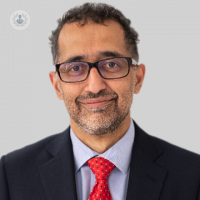TAVI: the alternative to open heart surgery
Written by:If you are in need of an aortic valve replacement but are not well enough for traditional heart valve surgery, you may be an ideal candidate for transcatheter aortic valve insertion (TAVI) instead. Here, expert cardiologist, Dr Iqbal Mailk, explains more about the procedure.

What is aortic stenosis?
Aortic stenosis is a serious valve disease problem. The aortic valve opening becomes narrow, which restricts blood flow from the left ventricle (the main heart pump) out to the aorta. This can lead to symptoms of chest pain, breathlessness or even blackouts.
What is the traditional surgical procedure for aortic stenosis?
Usually, open heart surgery (surgical aortic valve replacement) is performed when the patient is under general anaesthetic.
A large cut is made into the chest to allow the surgeon access to the heart. The heart is then stopped and a bypass machine is used to take over. The damaged or faulty valve is replaced with a new one, which is a tissue (animal) valve if you are older, or a metal one if you are younger than 60 years. The heart is restarted and your chest is closed. Recovery takes five to seven days in the hospital and about six weeks at home.
Risks of surgery include bleeding, heart attack, stroke, atrial fibrillation, wound infection, and, in rare cases, death.
What is TAVI?
TAVI is a relatively new procedure and is non-invasive compared to open-heart surgery. There are several approaches that can be using during TAVI, which include:
- Via the leg – the transfemoral route if your blood vessels are big enough
- Via the chest – the transapical route, which goes directly to the heart through a small cut on the chest
- Via the left shoulder – at the axillary approach.
Who is a suitable candidate for TAVI?
If you are at higher risk for an open operation on your heart, you may be suitable for TAVI. A multidisciplinary team (MDT) will make a thorough assessment to see if your heart and body will be suitable for the procedure.
What are the possible complications of TAVI?
Complications are possible because only higher-risk patients who cannot have open-heart surgery have this treatment. These include:
- Complications at the vascular access site – such as pain, bleeding, and bruising.
- Disruption of the normal electrical conduction system of the heart – this may require treatment with a pacemaker.
- Aortic regurgitation – due to the leaking of the aortic valve, which allows some blood to flow in the reverse direction.
- Stroke – debris can break off the old valve and go to the brain.
- Death - if the complication is severe enough.
However, TAVI has been shown to be a life-saving treatment with dramatic improvements in quality of life. You can see a video of how it is performed here. The standard risk of all the above in total is about five per cent. If you do not get urgent treatment, the risk without treatment is about 50%.
If you would like to discuss treatment for your aortic stenosis, you can book an appointment to see Dr Iqbal Malik via his Top Doctors profile. Can’t make it in person? He is also available for a video call using our e-Consultation tool, which can be found on his profile too.


